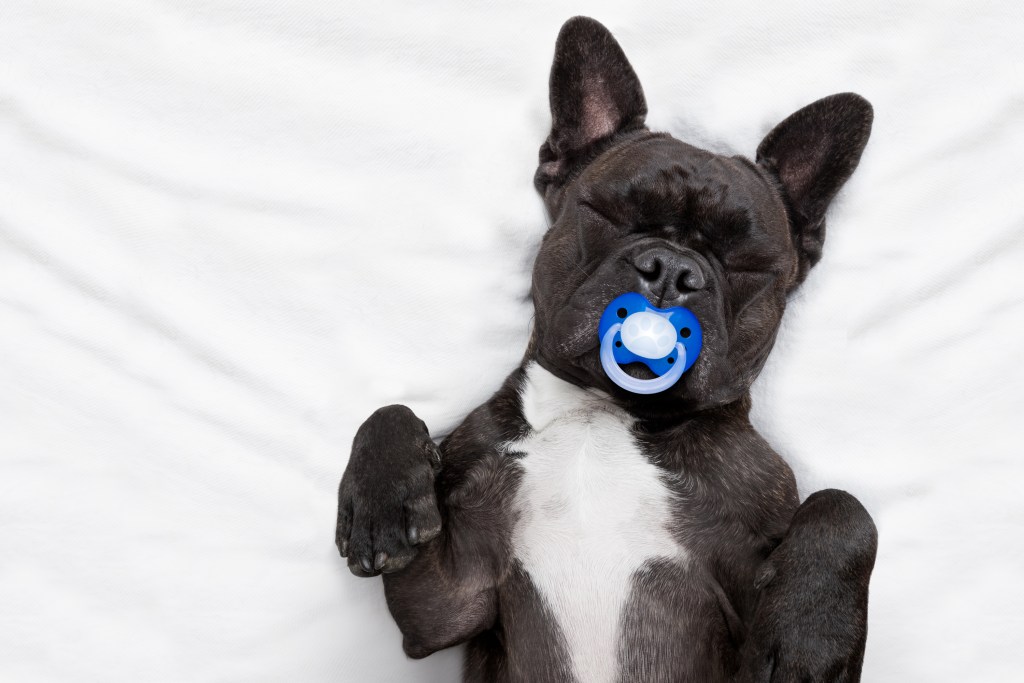Your baby makes noise at the most inconvenient times, slobbers, and drools. You have to clean up their poop. In fact, they’ll get just about everything dirty. They love to snuggle, and you can say goodbye to any sort of alone time ever again. But you’d never trade having them in your lives for anything. Are we talking about your fur baby or your human baby?
To be honest, there doesn’t seem to be much of a difference a whole lot of the time. Whether you’re a pet parent, a parent to human children, or both, you’re responsible for your baby’s love and care. But sometimes, they’re so alike, we can’t help but laugh.
Meet Ollie, a chocolate lab with 156,000 followers on Instagram. Ollie recently discovered the most prized possession for most babies: the pacifier. And he was absolutely pleased with his discovery, as you can see from his jaunty, happy behavior on his walk. Of course, Ollie’s pet parent didn’t let him keep the pacifier — as Ollie had found it on the ground with no clue where it came from — but did reward her four-legged friend with a pacifier of his own.
And he was ecstatic. Not only is his initial reaction adorable, but his dismay when the pacifier gets taken away for the night makes us just want to give the poor boy a hug.
Why do dogs love pacifiers?
No one knows for sure exactly why some dogs love pacifiers, but in this instance, it’s probably really true that they’re not all that different from babies: Pacifiers are a source of comfort and security. Much like a security blanket or a favorite chew toy, the pacifier puts the pup at ease — and, since dogs tend to be oral explorers (translation: put just about anything in their mouths), pacifiers fit the bill nicely.
Of course, just because your dog likes something doesn’t mean it’s good for them. (If dogs had it their way, there’d be a whole lot of toxic human foods on their dinner menu.) So, should you let your dog have a pacifier?

Are pacifiers safe for dogs?
While plenty of the comments on Ollie’s video declared it the cutest thing ever, others wondered whether it was safe: Are pacifiers bad for dogs’ teeth or their health in general?
Pacifiers designed specifically for puppies exist and pet parents buy them for a lot of reasons:
- To teach puppies who are just learning how to eat the proper way to chew
- To soothe teething puppies experiencing pain and discomfort
- To help clean a puppy’s teeth and remove tartar buildup
However, as with all treats for your dog, it’s important to give your four-legged friends toys that are appropriate to their age and size. And you also shouldn’t let your pup of any age get their hands on your kid’s pacifier.
Pacifiers made for humans aren’t necessarily made with pet-safe materials nor are they made to withstand a dog’s more powerful teeth — which means your pet could easily swallow a chewed-up piece of a pacifier or even the entire thing. (Consider the story of this poor dog who swallowed nine and had to have surgery.)
Be sure to keep human pacifiers — and other small choking hazards — out of your pup’s reach, and don’t hesitate to bring your dog to the vet if you think they’ve swallowed something they shouldn’t have. Not all dogs will calmly suck on a pacifier like Ollie, and it’s better to be safe than sorry.


